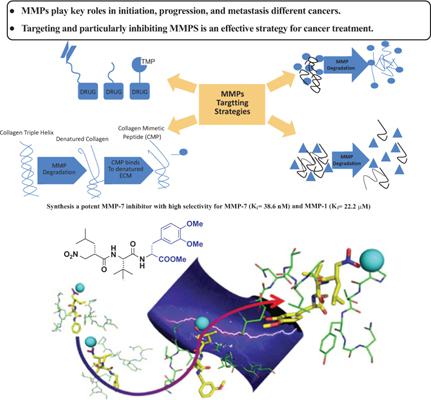Current Topics in Medicinal Chemistry ( IF 3.4 ) Pub Date : 2020-09-30 , DOI: 10.2174/1568026620666200722104928 Ling-Li Wang 1, 2 , Bing Zhang 3 , Ming-Hua Zheng 1 , Yu-Zhong Xie 2, 4 , Chang-Jiang Wang 3 , Jing-Yi Jin 2

|
Background: Matrix metalloproteinases (MMPs) are a family of zinc endopeptidases that play a key role in both physiological and pathological tissue degradation. MMPs have reportedly shown great potentials in the degradation of the Extracellular Matrix (ECM), have shown great potentials in targeting bioactive and imaging agents in cancer treatment. MMPs could provoke Epithelial to Mesenchymal Transition (EMT) of cancer cells and manipulate their signaling, adhesion, migration and invasion to promote cancer cell aggressiveness. Therefore, targeting and particularly inhibiting MMPs within the tumor microenvironment is an effective strategy for cancer treatment. Based on this idea, different MMP inhibitors (MMPIs) have been developed to manipulate the tumor microenvironment towards conditions appropriate for the actions of antitumor agents. Studies are ongoing to improve the selectivity and specificity of MMPIs. Structural optimization has facilitated the discovery of selective inhibitors of the MMPs. However, so far no selective inhibitor for MMP-7 has been proposed.
Aims: This study aims to comprehensively review the potentials and advances in applications of MMPs particularly MMP-7 in targeted cancer treatment approaches with the main focus on targeted drug delivery. Different targeting strategies for manipulating and inhibiting MMPs for the treatment of cancer are discussed. MMPs are upregulated at all stages of expression in cancers. Different MMP subtypes have shown significant targeting applicability at the genetic, protein, and activity levels in both physiological and pathophysiological conditions in a variety of cancers. The expression of MMPs significantly increases at advanced cancer stages, which can be used for controlled release in cancers in advance stages.
Methods: Moreover, this study presents the synthesis and characteristics of a new and highly selective inhibitor against MMP-7 and discusses its applications in targeted drug delivery systems for therapeutics and diagnostics modalities.
Results: Our findings showed that the structure of the inhibitor P3’ side chains play the crucial role in developing an optimized MMP-7 inhibitor with high selectivity and significant degradation activities against ECM.
Conclusion: Optimized NDC can serve as a highly potent and selective inhibitor against MMP-7 following screening and optimization of the P3’ side chains, with a Ki of 38.6 nM and an inhibitory selectivity of 575 of MMP-7 over MMP-1.
中文翻译:

靶向药物递送中的基质金属蛋白酶(MMP):合成的针对基质金属蛋白酶-7的有效且高度选择性的抑制剂。
背景:基质金属蛋白酶(MMP)是锌内肽酶家族,在生理和病理组织降解中均起关键作用。据报道,MMP在降解细胞外基质(ECM)方面显示出巨大潜力,在靶向生物活性剂和显像剂治疗癌症方面也显示出巨大潜力。MMPs可以激发癌细胞的上皮向间质转化(EMT),并操纵其信号传导,粘附,迁移和侵袭,从而促进癌细胞的侵袭性。因此,靶向并特别抑制肿瘤微环境内的MMP是治疗癌症的有效策略。基于该想法,已经开发出不同的MMP抑制剂(MMPI)以将肿瘤微环境控制在适于抗肿瘤剂作用的条件下。为了提高MMPI的选择性和特异性,正在进行研究。结构优化促进了MMPs选择性抑制剂的发现。但是,到目前为止,尚未提出针对MMP-7的选择性抑制剂。
目的:本研究旨在全面综述MMPs尤其是MMP-7在靶向癌症治疗方法中的应用潜力和进展,主要关注靶向药物的递送。讨论了用于治疗和抑制MMP的不同靶向策略。MMP在癌症的所有表达阶段均上调。在各种癌症的生理和病理生理状况下,不同的MMP亚型在遗传,蛋白质和活性水平上均显示出显着的靶向适用性。MMPs的表达在晚期癌症阶段显着增加,可用于晚期癌症的控释。
方法:此外,本研究介绍了一种新型且高度选择性的抗MMP-7抑制剂的合成和特性,并讨论了其在靶向药物递送系统中用于治疗和诊断方法的应用。
结果:我们的发现表明,抑制剂P3'侧链的结构在开发具有高选择性和针对ECM的显着降解活性的优化MMP-7抑制剂中起着至关重要的作用。
结论:经过筛选和优化P3'侧链后,优化的NDC可以作为针对MMP-7的高效和选择性抑制剂,Ki为38.6 nM,对MMP-1的抑制选择性为575。



























 京公网安备 11010802027423号
京公网安备 11010802027423号